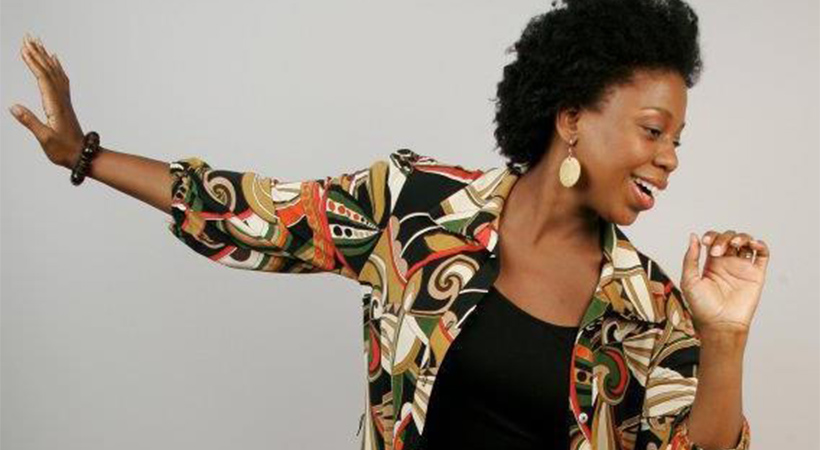
Turning an Interest into a Reality
CJay Philip, Camp CS Teaching Artist
Broadway Dance Teaching Artist CJay Philip has taught at Baltimore Center Stage for the last six summers. According to Education Coordinator Kristina Szilagyi, CJay is a triple-threat: she’s a Broadway veteran, a choreographer, and incredible educator and mentor to the young people she teaches.
We talked to CJay about her experience as a Camp CS Teaching Artist. Here’s what she had to say.
Tell us about what you teach at Camp CS.
I teach Broadway Dance and musical theater. It’s typically a movement class, but I always like to incorporate some sort of vocal, acting, and storytelling elements because what young people quickly learn when they start to do real musical theater is you don’t compartmentalize those things. Dancers need to be super comfortable opening their mouths and using their voice. If there’s an opportunity in the dance piece, even if it’s one or two lines to sing along with the music, I try to incorporate that. It helps build their confidence as they dance.
What is it like to watch the students grow in confidence throughout the two-week session?
I’ve noticed an interesting transformation. A lot of the students, even if they don’t consider themselves dancers, already have an interest in or just enjoy musical theater. So we start with that interest and unpack it, take away the mystery of it. We explore how all of these components come together and what we’re doing at the core of theater. A lot of what we’re doing is sharing a story or someone’s point of view, so you have to have an empathetic mindset. I like giving kids an opportunity to exercise that; to consider what a character is thinking and feeling. It goes a lot deeper than just the “razzle dazzle.” Ensemble work is also a huge part of the Broadway Dance class. So much of what actors do has to do with everybody else onstage. You have to know when to step forward and take the lead and when to pull back so someone else can shine. In this process, they’re learning a lot about theater, but also a lot about themselves and how they function. They discover their self-identity as well as their ensemble identity and how to navigate it.
Did you have anything like Camp CS as a young person that sparked your love of theater and dance?
When I was very little, my older sister took dance classes and hated it. I was always in the room, though, watching and following along. Finally, my mom realized my sister really didn’t want to do this class, but she didn’t want to waste the money. So she asked the teachers if I could take my sister’s place for the remainder of the classes. I was about three at the time, which was normally a little too young, but they saw that I had been keeping up with everyone and allowed me to take her place. So I took my first dance class and I just never stopped.
When I was in junior high, there was a new program called the Empire State Institute for the Performing Arts that was starting in Albany, NY at The Egg, which was the local theater. It involved training in dancing, acting, writing, and directing. It was just fantastic. That was my first stab as a writer, as a director, and as a choreographer. When I look at all the work the other teaching artists at Camp CS do with the students, it reminds me of that program and how much it gave students like me room to experiment with a lot of components of theater, to find what you’re gravitating towards. It gives them an understanding and respect for the full process. Until you’ve had to work with an ensemble, you don’t really get the full picture. I think that’s what kids are getting at Camp CS.
The Eddie C. and C. Sylvia Brown Education Center is a new addition to the theater. How will this space improve the Camp CS experience?
There’s something about feeling like you have a home that changes the energy of the individual and the energy of the group. The teaching artists and students have had to learn to be flexible over this last year of renovation. We did not always have a consistent space. That “nomad” status can affect you and you don’t even realize it. It makes you super flexible, but there’s this valuable sense of being grounded when you have a home. That consistency impacts children (and all of us) tremendously. What should parents who are considering sending their child to camp this summer know about the program?
One of the things that they should know is that the process, the friendships, the creative play is real and it’s present all throughout their day. Yes, this program will help them with their confidence and their focus, but I love to watch their relationships build over time. You come into the rehearsal process on the first day and everything is very introductory. But by day three, everyone becomes best friends. There’s this sense of comradery and friendship. Those are the things that are invaluable.
I think sometimes that parents can get fixated on the final show at the end of the session. But they should know that the show is ultimately the frosting on a seven layer cake. Your child has had an awesome experience from day one all the way up to the performance. That performance may be the main part that the parents see, but there’s so much more that is so rich and so nourishing for their children in that two week process.



